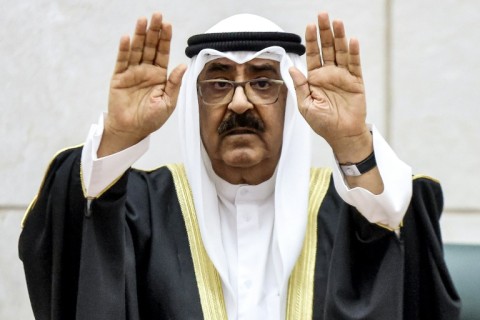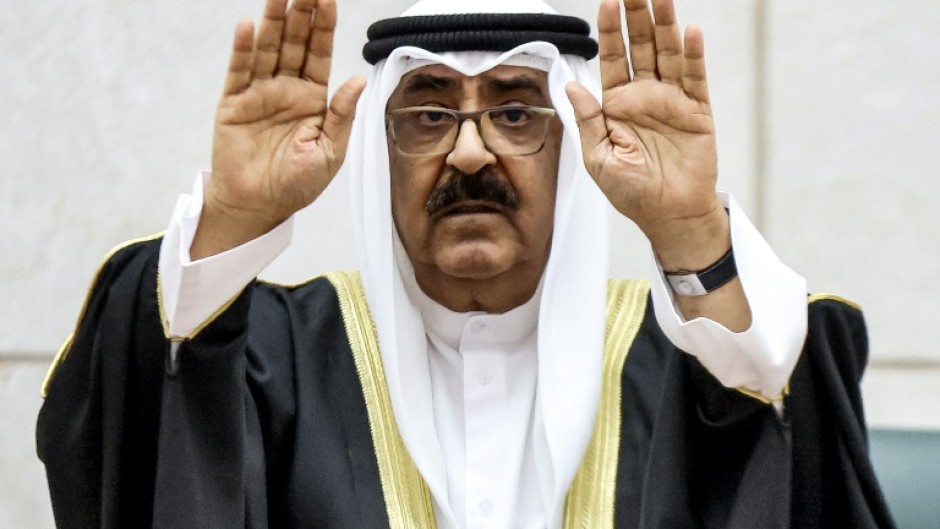Kuwait saw a quick transition to a new emir on Saturday following the death at 86 of Sheikh Nawaf al-Ahmad Al-Sabah after three years in power.
He was succeeded by his half-brother, Sheikh Meshal, who takes over the oil-rich Gulf kingdom at the age of 83, state television reported.
Sheikh Meshal, who had already assumed some key constitutional duties of the emir in 2021, has spent most of his career in Kuwait's security and intelligence apparatus, keeping a distance from the often bitter disputes within the royal family.
His predecessor's reign was short but tumultuous, marked by deep political turmoil and economic challenges triggered by a fall in oil prices that have left it lagging its wealthy Gulf neighbours, the United Arab Emirates, Qatar and Saudi Arabia.
State TV cut its regular programming and switched to a broadcast of a Koranic recital before announcing Sheikh Nawaf's death.

"With great sadness and sorrow, we mourn... the death of Sheikh Nawaf al-Ahmad Al-Sabah, Emir of the State of Kuwait," said a statement on state TV.
Public offices will shut for three days and 40 days of mourning were declared.
Sheikh Nawaf, who will be laid to rest on Sunday, had been hospitalised in November for an undisclosed "emergency", but had been said to be in a stable condition.
- 'Devout, modest' -
Born in 1937, Sheikh Nawaf took over as emir in September 2020 upon the death of another half-brother, Sheikh Sabah, at the age of 91.
Kuwait, a conservative country where sovereign powers are concentrated in the hands of the ruling Al Sabah family, is home to the most active and powerful parliament in the Gulf.
But repeated standoffs between elected lawmakers and cabinet ministers installed by the ruling family have hindered development efforts and discouraged investors.

Sheikh Nawaf's rule saw three parliamentary elections in as many years, and there have been five different government cabinets in 2023.
The political deadlock has delayed necessary reforms and blocked development projects, leaving infrastructure and education in disrepair and much of the population disgruntled.
Sheikh Nawaf issued numerous amnesties for political prisoners, earning him the title "emir of pardons".
He will "be remembered for his unique personal attributes: soft spoken, devout, modest, low profile", said Bader al-Saif, a history professor at Kuwait University.
Condolences flooded in from around the world.
"He served his country for six decades and fulfilled his duty with all sincerity," said Sheikh Mohammed bin Rashid Al Maktoum, the ruler of Dubai, on X, formerly Twitter.
Saudi Arabia's royal court said the kingdom "and its people share the sorrows of their brothers in the State of Kuwait".
British Prime Minister Rishi Sunak called the sheikh "a great friend of the UK" and a statement by the Kremlin said "he had great authority in the Middle East."
- 'Insider-Outsider' -
A father of 12, Sheikh Meshal becomes Kuwait's 17th ruler. He will have a year to name a new crown prince amid speculation on whether he will appoint an heir from a younger generation.
The choice of crown prince will reflect "internal ruling family dynamics," said al-Saif.
"Whether Kuwait witnesses its first generational shift in decades or not... the country will need to deliver on various fronts."
Meshal was deputy chief of the Kuwait National Guard from 2004 to 2020, and was named crown prince when Sheikh Nawaf took power.
He spent many years in the interior ministry, rising through the ranks to head the department of general investigation from 1967 until 1980 where he was credited for strengthening its function as a state security service.
"With a career in the security bureau and national guard, Sheikh Meshal is an insider-outsider," said al-Saif on X, formerly Twitter.
"He was 'in the room' close to 3 of the previous 4 emirs on daily matters without" being in government, he said.
In 2016, Sheikh Meshal travelled abroad and underwent a "successful operation", but details of the treatment were not disclosed.


